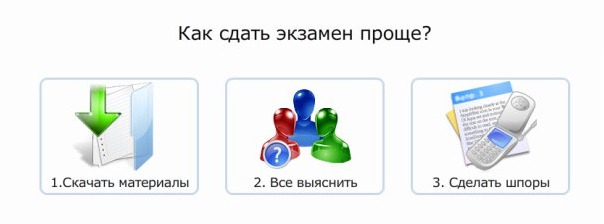Print cheat sheets - is it evil?

This post was supposed to start another blog post “I am promoting”, but it turned out to be too independent.
Why do we need computers? To do a job for a man (“Robot injects, happy man”). Over time, more and more activities are delegated to computers and do not require human participation. This is a general global trend of progress, there is no getting away from it. And now modern technology helps students to freeze. How bad is it and what to do about it?
')
Knowledge vs thinking
When a person works, the necessary knowledge is automatically deposited in his head due to frequent repetition. However, a person cannot work if he does not know anything. Therefore, it turns out that he must receive the necessary base, which will be expanded or narrowed automatically in the process of using this knowledge.
Universities cannot give exactly the information that a particular student will use later, therefore a higher education is universal - information is redundant. The main task of universities (IMHO) is to form the thinking that will allow a person to solve the tasks that may arise in front of him, because the brain needs to be trained.
Another point: the amount of information grows exponentially, information quickly becomes outdated. University programs are not yet capable of changing so dynamically, while self-education of students automatically adapts to modern realities. Now what a person remembers is secondary compared to the speed of searching and assimilation (understanding) of new information.
In the bottom line, we have: a graduate of a university must be smart (have a certain way of thinking), and the survey knowledge gained in a university is necessary for the formation of thinking. After graduating from a person, a base is formed for starting in a fairly wide range of areas.
In the process of learning, a student gets a certain amount of knowledge at lectures and trains thinking at seminars, solving certain tasks. In practice, it turns out that a student is already an adult enough to make independent decisions; he filters out extra information (some, however, filter all information, but these are their problems — they will find their way in life).
And then the session comes!
Ghostbusters Cribs
What does a student need during a session? Get your grades and continue learning.
Acquiring grades is the main goal of students during a session (gaining knowledge should be a goal during the semester)
On average, 80% of students are still preparing for the exam, the rest are classified as “freeloaders” or “academicians” (from the word “academic leave”). Of these 80%, the majority learns tickets and prepares reinsurance in the form of spurs. Those who do not prepare will not prepare no matter how easy it is to make spurs, and those who at least read something will also do it anyway.
The preparation of spurs consists of collecting material and direct preparation of material carriers. During the collection of material, the student simultaneously learns this material, but the second stage eats up the time that could be spent on study.
: “-” . «-» - - , ( , ). . , . - – , BT- , .In the preparation of cribs there is a certain progress, driven by the laziness of students. And progress is such a pretty strong thing.
Knowledge Control vs Thinking Test
What does all this lead to? To pass the exam requires less knowledge and less effort - there is a discredit of the education system. On exams, students' knowledge is no longer checked.
Does this reduce the overall quality of education?
In my opinion, if it does, it is insignificant - the students are quite capable of deciding on their own what knowledge they need. And those students who are not able to make such a decision will not save a large amount of knowledge, because they do not develop independent thinking. And the fact that in junior classes they fight more strongly helps students not to fly out until they can understand what needs to be done.
However, the fact that exams lose their test function cannot be called positive - there was a certain mechanism that stops working. What to do with it? It's time to stop trying to test students' knowledge - you need to test your thinking. Almost any information can be found fairly quickly, but to learn to think on the Internet is impossible.
I consider the most appropriate approach - permission to use the literature when preparing a ticket, but at the same time, as additional questions, to focus on solving problems (to test thinking).
The second option - tightening control - is the fight against windmills and the path is a dead end.
And students will continue to try to freeze in all possible ways and will improve their skills in quickly finding, processing and perceiving information.
Source: https://habr.com/ru/post/80778/
All Articles